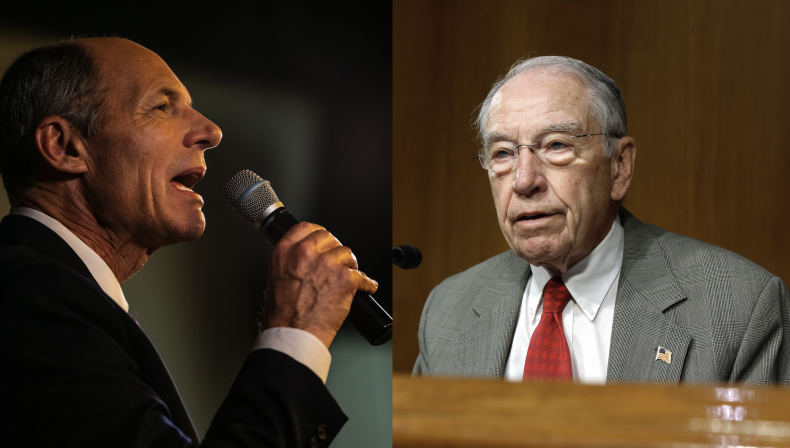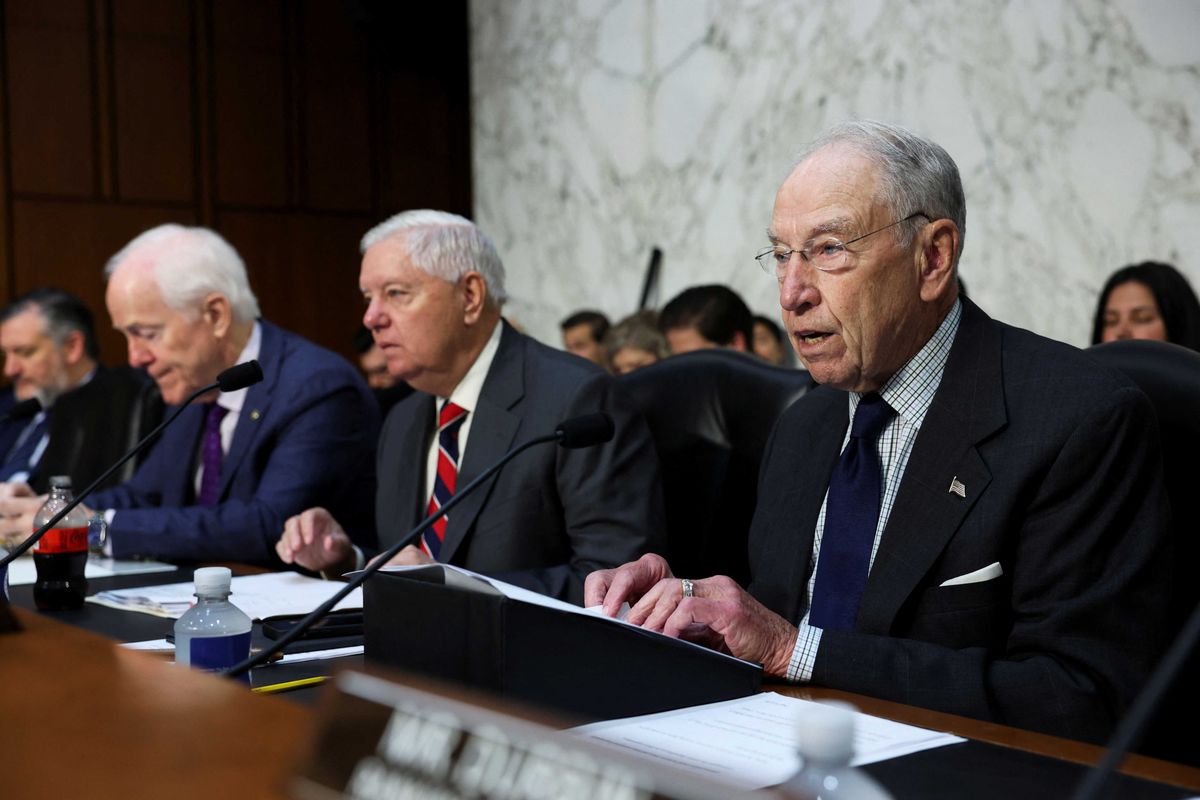BY JASON LEMON
ON 7/17/22
Democrat Mike Franken aims to defeat GOP Senator Chuck Grassley in Iowa in the upcoming November midterms, hoping to flip a Republican-held seat blue to help his political party retain, or possibly shore up, their slim majority in the Senate—but recent polls show he's facing an uphill battle.
Grassley, 88, has held his Senate seat since 1981 and is one of the oldest elected members of the legislative body. Franken is a retired Navy vice admiral and former Defense Department official. The Democrat previously ran unsuccessfully for his party's nomination to run against GOP Senator Joni Ernst in 2020. He won the June primary this year, however, with just over 55 percent of the vote.
In a conservative leaning state that went for former President Donald Trump in 2016 and in 2020, with two Republican senators and a GOP governor, Franken has a difficult race ahead. Recent polls show the Democratic candidate trailing the Republican incumbent.
Democrat Mike Franken aims to defeat GOP Senator Chuck Grassley in Iowa in the upcoming November midterms, hoping to flip a Republican-held seat blue to help his political party retain, or possibly shore up, their slim majority in the Senate—but recent polls show he's facing an uphill battle.
Grassley, 88, has held his Senate seat since 1981 and is one of the oldest elected members of the legislative body. Franken is a retired Navy vice admiral and former Defense Department official. The Democrat previously ran unsuccessfully for his party's nomination to run against GOP Senator Joni Ernst in 2020. He won the June primary this year, however, with just over 55 percent of the vote.
In a conservative leaning state that went for former President Donald Trump in 2016 and in 2020, with two Republican senators and a GOP governor, Franken has a difficult race ahead. Recent polls show the Democratic candidate trailing the Republican incumbent.

Senator Chuck Grassley, an Iowa Republican, is the clear frontrunner in his reelection campaign against Democratic challenger Mike Franken, according to recent polls. Above to the left, Franken speaks at a primary election-night event on June 7 in Des Moines, Iowa. Above to the right, Grassley speaks at a hearing with the Senate Judiciary Committee on July 12 in Washington, D.C.
STEPHEN MATUREN/ANNA MONEYMAKER/GETTY IMAGES
New polling published by Des Moines Register/Mediacom Iowa Poll on Saturday had Grassley just 8 points ahead of Franken. The incumbent GOP senator was backed by 47 percent of likely Iowa voters compared to 39 percent who supported his Democratic challenger.
While the Republican has a substantial lead, the new poll results were the worst for Grassley in more than three decades.
"While Grassley leads Franken, the margin is narrower than in any Iowa Poll matchup involving Grassley since he was first elected to the U.S. Senate. Grassley has not polled below 50% in a head-to-head contest since October 1980, before he went on to defeat incumbent Democratic U.S. Sen. John Culver," Des Moines Register reported.
The survey included 597 likely Iowan voters and had a margin of error of plus or minus 4 percentage points. It was carried out from July 10 to 13 by Selzer & Co.
A previous poll conducted from June 30 to July 4 for Franken's campaign by Change Research showed a closer race, although Grassley was still in the lead. The survey results had the Republican senator at 49 percent while the retired Navy officer came in at 44 percent. That was a lead of 5 points for the incumbent.
The poll included 1,488 likely voters and had a margin of error of plus or minus 2.7 percent.
In April, a similar Change Research poll for Franken's campaign showed the Democrat down by 3 points. Grassley was backed by 45 percent of likely voters and the Democratic candidate had the support of 42 percent. Some 1,070 respondents were included in the survey with a margin of error of plus or minus 4 percent.
New polling published by Des Moines Register/Mediacom Iowa Poll on Saturday had Grassley just 8 points ahead of Franken. The incumbent GOP senator was backed by 47 percent of likely Iowa voters compared to 39 percent who supported his Democratic challenger.
While the Republican has a substantial lead, the new poll results were the worst for Grassley in more than three decades.
"While Grassley leads Franken, the margin is narrower than in any Iowa Poll matchup involving Grassley since he was first elected to the U.S. Senate. Grassley has not polled below 50% in a head-to-head contest since October 1980, before he went on to defeat incumbent Democratic U.S. Sen. John Culver," Des Moines Register reported.
The survey included 597 likely Iowan voters and had a margin of error of plus or minus 4 percentage points. It was carried out from July 10 to 13 by Selzer & Co.
A previous poll conducted from June 30 to July 4 for Franken's campaign by Change Research showed a closer race, although Grassley was still in the lead. The survey results had the Republican senator at 49 percent while the retired Navy officer came in at 44 percent. That was a lead of 5 points for the incumbent.
The poll included 1,488 likely voters and had a margin of error of plus or minus 2.7 percent.
In April, a similar Change Research poll for Franken's campaign showed the Democrat down by 3 points. Grassley was backed by 45 percent of likely voters and the Democratic candidate had the support of 42 percent. Some 1,070 respondents were included in the survey with a margin of error of plus or minus 4 percent.
Although Grassley is clearly the frontrunner in the Senate race, Franken appears to be performing well for a Democratic challenger to the GOP incumbent. In every reelection campaign since 1986, Grassley has beat his liberal challengers by large double-digit margins.
No Democrat has managed to win even 40 percent of the vote against him. Whether Franken ultimately manages to do so, or potentially even pull off an upset victory, remains to be seen.
"It's a solid lead [for Grassley]," pollster J. Ann Selzer told Des Moines Register. "But it's just not as huge as we've seen in the past."











 Then-Vice President Joe Biden and his son Hunter at a basketball game in 2010. (Jonathan Ernst/Reuters)
Then-Vice President Joe Biden and his son Hunter at a basketball game in 2010. (Jonathan Ernst/Reuters)




